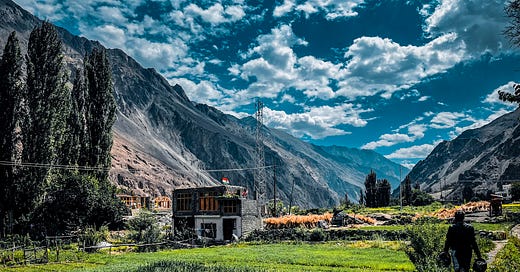4 min lettura
[Eng Below]
Tra i più grandi produttori di albicocche al mondo c’è il Pakistan e io non ne avevo idea prima di raggiungerlo. Di raggiungerlo per un pelo, in realtà: i militari ci hanno fermato a un posto di blocco. Solo gli indiani sono ammessi al confine. Noi eravamo bardati per polvere e vento. Casco, giacca, guanti, fasce, occhiali da sole: nemmeno un centimetro di pelle scoperto ed esposto alla valutazione dei tre soldati, ma gli è bastata un’occhiata e ci hanno bloccato. Non assomigliate a indiani e più in là non andate.
Abbiamo obbedito.
E la notte l’abbiamo passata a Turtuk, la verdissima frontiera tra India e Pakistan. Turtuk: solo il nome ispira simpatia. Pare il titolo di una filastrocca, pare il nome della bimba che saltella e si nasconde in mezzo a spighe di grano quando le passo accanto, per poi seguirmi timida con lo sguardo. Mi sembra troppo giovane per avere la testa velata, ma da come ride e saluta con la manina curiosa capisco che il problema è soltanto mio.
Sono a Turtuk che è un villaggio, ma sembra più una collina di sentieri acciottolati che rincorrono un ruscello. Le abitazioni intorno sono un tutt’uno con i campi, senza recinti, nemmeno per gli animali che entrano ed escono. L’aia o la camera, stalla o cucina: la vita è in comune. E dappertutto albicocchi giganti così pieni di frutti che gli si piegano i rami e ovunque per terra albicocche ammucchiate, nei canestri o sui teli, a essiccare.
Turtuk è a 8 chilometri dal Pakistan oggi, ma cinquant’anni fa era Pakistan: il confine è cambiato, il governo è cambiato, ma le albicocche non l’hanno saputo. Ne colgo una e il gusto è proprio quello che ti aspetti: ha il sapore succoso di un secolo passato. Ci perdiamo e ci ritroviamo, ci perdiamo di nuovo. E l’atmosfera pure è proprio quella che ti aspetti: ha il sapore nostalgico di un secolo mai esistito.
Gli odori li riconosco benissimo però, perché varie città mi hanno ospitato nel tempo e gli ultimi anni li ho vissuti a Milano, ma di milanese in me c’è ben poco. Io dentro ho gli odori della campagna. Dal mio accento quando parlo al gusto per il cibo, dai proverbi nelle orecchie all’acqua santa che scotta: tutto in me parla di Umbria. In Umbria a vivere non ci torno - non è affatto il posto per chi si annoia facilmente - ma porto a spasso con me quella sua cocciuta solitudine. E le radici quelle sì: raccontano di borghi rosa e fiori nei vicoli, di bruschetta e olio d’oliva (verde che se non picca in gola non vale niente), di galline e zucchine nei campi. Le radici raccontano di una bambina che gioca con la terra, coi sassi e con gatti ossuti che non fanno compagnia, ma cacciano i topi.
E quindi Turtuk non la conosco, quelle ragazze che falciano il grano - pelle scura e occhi grandi - non potrebbero essere più diverse da me, però gli odori intorno sanno di casa. Di erba tagliata, di fattoria, di orto. E mi sembra di essere in pace, mentre cammino.
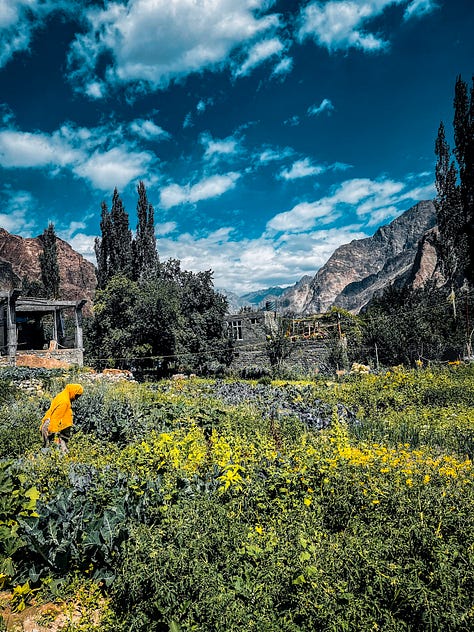
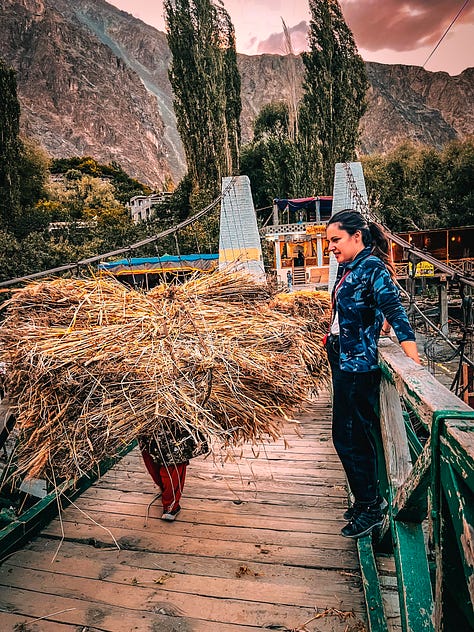
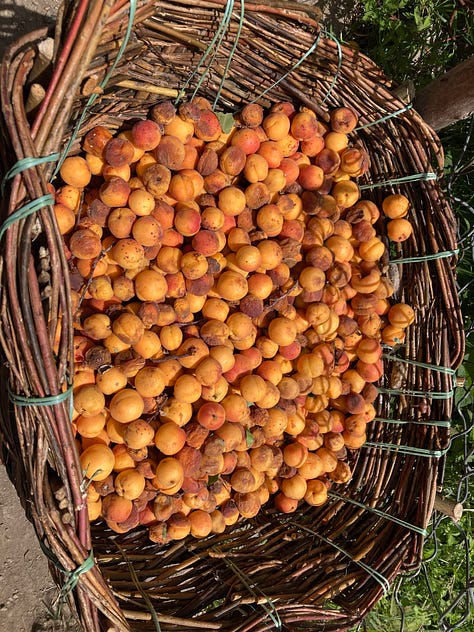
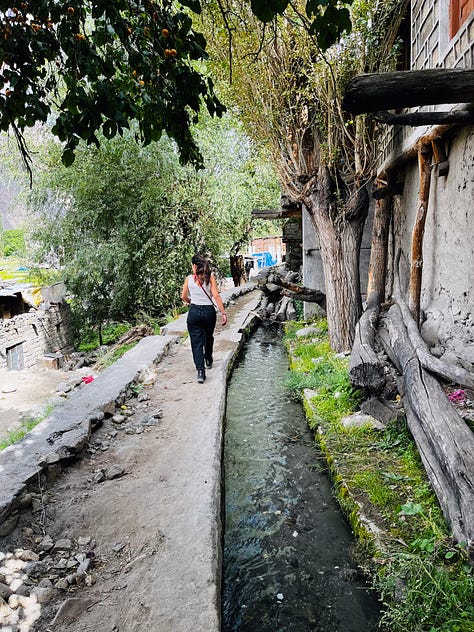
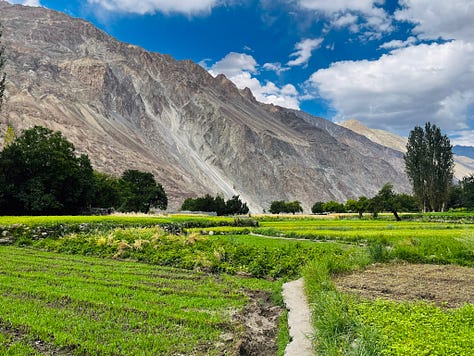
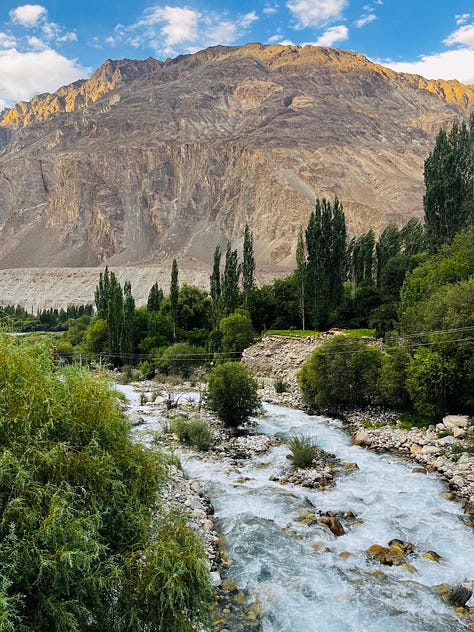
Ti sei perso le prime due tappe in moto in Ladakh? Eccole: Il mal di montagna del tricolore & Il dondolio degli angeli.
Se invece volessi dare un addio a Milano con me, clicca qui: Fai la brava, Milano
La stradina si inerpica e continuo a salire, il pezzo forte dovrebbe essere in vetta: il tempio lassù che sovrasta il villaggio. È il simbolo massimo di un’identità contesa da guerre e guerriglie: i capelli nascosti delle donne parlano di Islam, ma dall’alto a giudicarle davanti al tempio c’è un Budda dorato.
Il posto però è davvero magnifico, da lì vedo campi gialli di grano, prati smeraldo puntinati di albicocche e il fiume Shyok che avanza enorme. Però non è il pezzo forte, quello lo trovo qualche passo più in là. Al cimitero. Un cimitero che profuma di umiltà. Quando non hai nulla i tuoi cari li onori così come puoi e le lapidi le fai con quello che trovi. Non ci sono pietre o lastre di marmo, ma ogni tomba è segnata da una latta in metallo - vecchia di anni. Il risultato non mette tristezza, ma al contrario è caldo e accogliente: un marrone ruggine che si confonde col terreno.
La morte non è altro che proseguo e qui si vede bene: passi la vita a lavorare la terra e poi è la terra che rimpasta te.
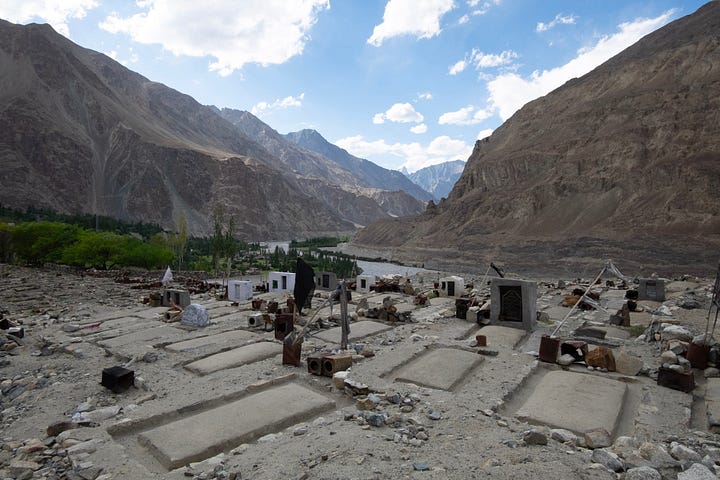
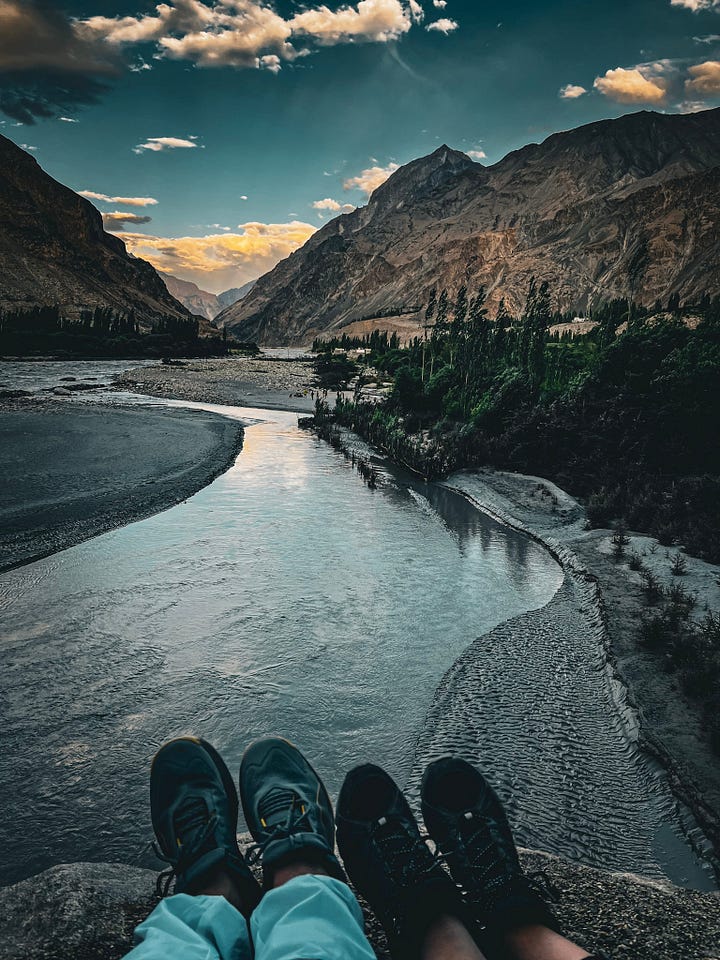
Il pezzo forte dicevo, lo scovo da lì.
Così tante volte l’ho visto in un video, nei documentari delle arrampicate. Al di qua di uno schermo pareva un po’ finto e invece me lo ritrovo splendente a sinistra.
È lì solenne che mi fa l’occhiolino, a dirmi: ero qui, proprio qui, ma non mi guardavi.
È inconfondibile: vicino e imponente. È il numero due sul tetto del mondo.
È emozionante: squadrato e maestoso. È lì che mi osserva e lui c’è da sempre.
E poi mi ricorda che io sono niente.
Il K2.
Gaia
Se ti è piaciuto, qui puoi aiutarmi a condividere il racconto:
Hai letto fino a qui? Clicca sul cuoricino, così saprò che ci sei! <3
Sennò puoi addirittura lasciami un commento:
[ENG - 4 MINUTES READING TIME]
DISPUTED APRICOTS
Among the world's largest apricot producers is Pakistan, and I had no idea until I reached it. Barely reached it, actually: the military stopped us at a checkpoint. Only Indians are allowed at the border. We were geared up for dust and wind: helmet, jacket, gloves, bandanas, sunglasses - not a centimeter of skin exposed for the three soldiers’ assessment, but one look was enough to stop us. You don't look like Indians, and you can't go any further.
We obeyed.
And we spent the night in Turtuk, the green border between India and Pakistan. Turtuk: the name itself is charming. It sounds like the title of a nursery rhyme, like the name of the little girl who hops and hides among the wheat stalks as I pass by, then follows me shyly with her gaze. She seems too young to have her head veiled, but from the way she laughs and waves her curious hand, I realize the issue is only mine.
Hey! How are you today? Thanks for reading! Subscribe for free to receive new posts:
I’m in Turtuk, which is a village, but looks more like a hill of cobbled paths chasing a stream. The houses around are one with the fields, with no fences, not even for the animals that come in and out. The yard or the room, barn or kitchen: life is communal. And everywhere, giant apricot trees so full of fruit that their branches bend, and apricots scattered all over the ground, in baskets or on sheets, drying.
Turtuk is 8 kilometers from Pakistan today, but fifty years ago it was Pakistan: the border has changed, the government has changed, but the apricots didn’t know it. I pick one, and it tastes just as you'd expect: it has the juicy flavor of a century gone by. We get lost and find each other, get lost again. And the atmosphere as well is just as you'd expect: it has the nostalgic flavor of a century that never existed.
The smells, though, I recognize perfectly, because various cities have hosted me over time and I’ve spent the last few years in Milan, but there’s very little Milanese in me. Inside, I carry the smells of the countryside. From my accent when I speak to my taste for food, from proverbs in my ears to holy water that burns: everything in me speaks of Umbria. I won’t go back to live in Umbria - it's not the place for someone who gets bored easily - but I carry its stubborn solitude with me. And the roots, yes: they tell of pink villages and flowers in the alleys, bruschetta and olive oil (green that’s worthless if it doesn’t sting your throat), of chickens and zucchini in the fields. The roots tell of a little girl who plays with the earth, with stones and with skinny cats that don’t keep company, but hunt mice.
And so I don’t know Turtuk, those girls harvesting wheat - dark skin and big eyes - couldn’t be more different from me, however the scents around smell of home. Of cut grass, of farm, of garden. And I feel at peace as I walk.
Hi! Have you read the first two episodes in Ladakh yet? Here they are: THE TRICOLOR’S ALTITUDE SICKNESS & ROCKING OF ANGELS
If you would like to say goodbye to Milan with me instead, click here: BE GOOD, MILANO
The path climbs and I keep ascending; the highlight should be at the top: the temple up there overlooking the village. It’s the ultimate symbol of an identity contested by wars and skirmishes: the hidden hair of the women speaks of Islam, but there is a golden Buddha judging them from above in front of the temple.
The place, however, is truly magnificent. From up there I see yellow wheat fields, emerald meadows dotted with apricots, and the vast Shyok River advancing enormously. But it’s not the highlight; I find it a few steps further. At the cemetery. A cemetery that perfumes humility. When you have nothing, you honor your loved ones as best you can, and the gravestones are made from what you find. There are no stones or marble slabs, but each grave is marked by a metal can - years old. The result isn’t sad; on the contrary, it’s warm and welcoming: a rusty brown that blends with the earth.
Death is nothing but continuation, and here it’s evident: you spend your life working the land, and then it’s the land that reshapes you.
The highlight, as I was saying, I discover from there.
So many times I’ve seen it in a video, in climbing documentaries. On this side of a screen, it seemed a bit fake, but here it is, gleaming to my left.
There it stands, solemnly winking at me, saying: I was here, right here, but you weren’t looking.
It’s unmistakable: close and imposing. It’s number two on the roof of the world.
It’s exciting: squared and majestic. It's there watching me, and it has been there forever.
And then it reminds me that I am just nothing.
The K2.
Gaia

